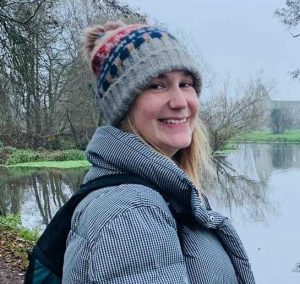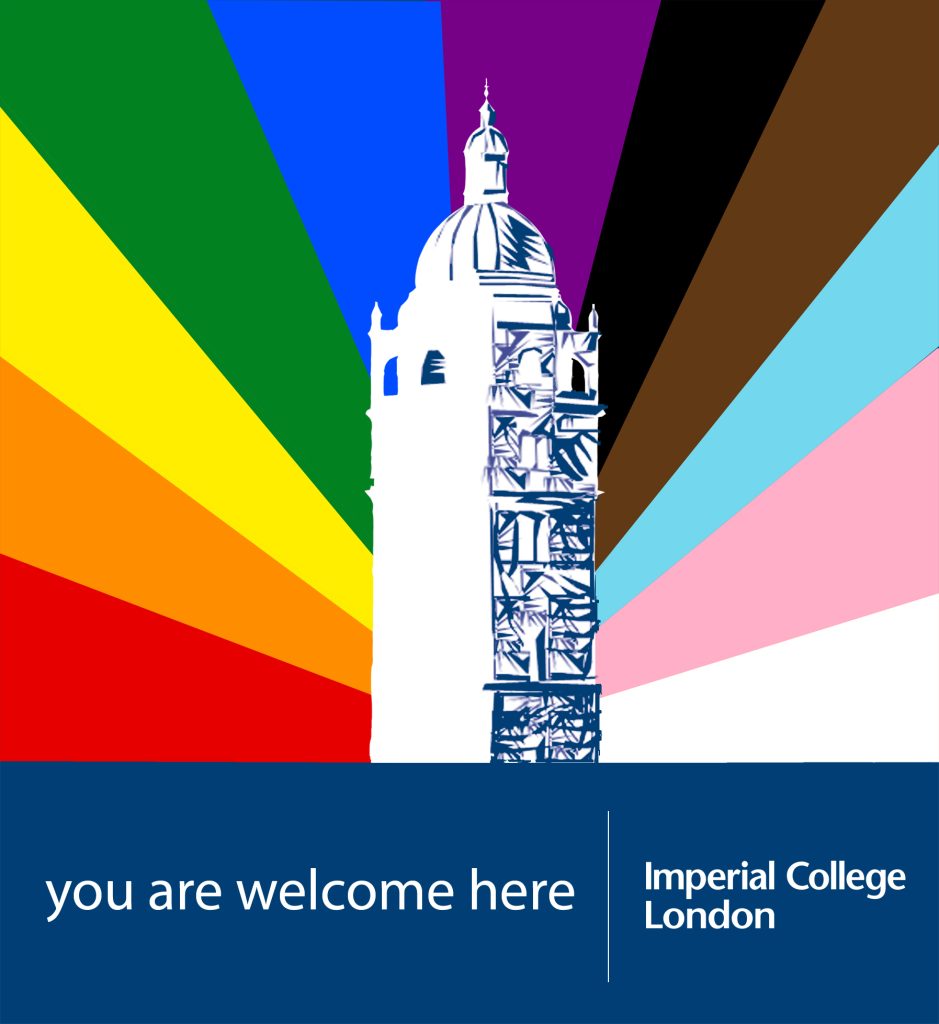Interview with Dr Philippa Wells: “I think representation and community is important in general for LGBTQ+ people but even more so in STEM”

Philippa is currently a Research Associate in the Nott group in the Department of Brain Sciences at Imperial and the UK Dementia Research Institute at Imperial. Philippa completed her BSc (Hons.) in Medical Sciences at the University of Exeter and PhD in Genetic Epidemiology at King’s College London (KCL). Philippa then joined Imperial College London as a Research Associate in the lab of Abbas Dehgan.
Tell me a little bit about yourself.
I grew up in Lincolnshire, which is in the East Midlands (and is famous for Lincoln cathedral and Lincolnshire sausages). After I moved out of my parent’s house, I moved to Exeter to do my undergraduate degree, so I feel I also have some roots in Devon. I then moved to London for my PhD and I have stayed here since. Growing up, I lived pretty much in the middle of nowhere, so it’s strange to think that I can now call a place as busy as London my home!
What was your journey in science like?
My journey in science started while I was still an undergrad. As part of my course, I organised a research placement where I worked with post-mortem brain samples from patients with Alzheimer’s Disease at the University of Bristol and the Bristol Brain Bank. This was also the first time I came across bioinformatics and I realised I would really like to work in that area. At the time, I was interested in a lot of different things (and to be honest I still am!) and was not sure what to specialise in during my PhD. In the end, I decided that studying the microbiome is a good place to start my research career as you can apply it to many different types of diseases. This led me to study the link between the microbiome and rheumatoid arthritis, and how genetics drive that link, for my doctoral training. However, after my PhD was over, I realised I really wanted to go back to studying Alzheimer’s Disease and apply the bioinformatics knowledge I gained during my training in that field. This brings me to where I am today, working as a postdoctoral researcher on the cell type-specific epigenome of Alzheimer’s Disease.
Do you think being LGBTQ+ influenced your journey in science and/or the choices you made along the way?
This is tricky to answer because I think it’s hard to know for sure, we all have multiple things which influence us and it can be hard to separate one from another. However, in school, I did come across a lot of homophobia, which likely made me internalize some of that and led me to shy away from sharing my identity with others. Now, I can see how that experience may have led me to feel less confident in my identity and in myself in general. And as anyone who works in science can tell you, confidence is really important to succeed!
However, I wouldn’t say that being LGBTQ+ has influenced my journey into science too strongly. I’m also a female, so within science, I’m part of two minority groups (female and LGBTQ+). Female scientists are known to suffer more, on average, from imposter syndrome and are less likely to progress to independence within academia. So, this aspect may have also played a role in how I felt during the early stages of my PhD.
One thing that I really appreciated, though, during my doctoral training, is working in a very diverse lab surrounded by many other LGBTQ+ people and women like myself. This felt like a supportive place to develop as a scientist, and it definitely had a positive impact on my academic journey and well-being. Now, during my postdoc, I once again feel very fortunate to be part of a diverse lab where people with different backgrounds are welcomed and supported.
What do you think needs to happen to improve the experiences of LGBTQ+ people in STEM?
I think representation and community is important in general for LGBTQ+ people but even more so in STEM where I feel there is a lack of visibility. Imperial is actually the first workplace I’ve been part of where there is a department-specific LGBTQ+ network and it does make me feel welcome and supported. We also have rainbow stickers in the entrance to the 7th floor Uren Building and across the office spaces (where I’m based too), which sounds like such a small thing, but it really goes a long way in making LGBTQ+ people like myself feel welcome.
What piece of advice would you give to LGBTQ+ students who are thinking of starting a career in research?
The best advice I could give would be to work with supportive supervisors, who will give you the right opportunities for you to develop and publish papers, as these are so important in the early career stage. When I was younger, I was very focused on finding the right project but did not pay as much attention to the supervision style of all of the supervisors, which I think is a very common mistake that students make. You might have the most exciting project, but if you don’t have the right support and the right people around you, it will be an unnecessarily challenging experience in the wrong ways. So, before you decide on PIs, I recommend visiting their office, talking to their students and seeing the kind of environment you will be working in. Also, have faith in yourself and trust your gut feeling! If your gut tells you that a place is not good for you, you should trust it. Bear in mind, this piece of advice comes from someone who actually studied the gut microbiome!
What advice would you give your younger self?
I’d tell my younger self to have more confidence in her abilities and to spend less time worrying about whether things will work out and whether she’s doing well enough. Have the confidence that even if things don’t work out as you planned, you will always be able to recover from it and find new and exciting opportunities, some even a lot better than you might think. You will also be a lot happier if you try to enjoy the journey rather than always focusing on the long-term destination. When I look back, my life has been really transformed to how it is today because of my science. This, of course, is advice that I also need to take in the present! But even just taking a step back every so often and shifting your focus on the present helps put things into perspective.
I’d also tell my younger self to look for people who care and to surround herself with them. There will always be good days and bad days, but those bad days will feel a lot better when you have the right people around you to help you get through them.
This interview is one of the many initiatives run by the LGBTQ+ Allies Network in the Department of Brain Sciences at Imperial. If you would like to get involved with what we do or just find out more about us, follow this link.
